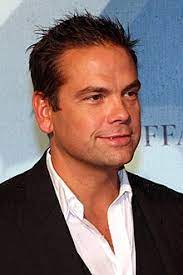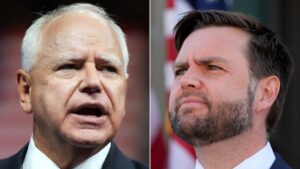Unveiling Lachlan Murdoch: The Future Face of Fox News and the Murdoch Dynasty

In the realm of media moguls, Lachlan Murdoch is poised to ascend to a position of unprecedented power. The impending transition, however, raises questions about whether his time has truly arrived.
In a recent announcement, Rupert Murdoch, his father, revealed his intentions to step down as the head of two media giants, News Corp. and Fox Corp., in November. This seismic shift in leadership will see Lachlan Murdoch taking the reins as the chairman of News Corp., all while retaining his roles as chief executive and chairman at Fox Corp., the parent company of the renowned Fox News Channel.
This change effectively anoints Rupert’s eldest son as the undisputed leader of the sprawling media empire meticulously crafted by his father over decades. Notably, there appears to be no significant contention from his siblings, James and Elisabeth, who were once viewed as potential rivals. James, in particular, has distanced himself from the company and its political affiliations for several years. Yet, within the Murdoch dynasty, history has shown a penchant for elevating eldest children only to later challenge and unsettle them — a practice that often transpires unexpectedly.
Considering Rupert Murdoch’s advanced age, this transition could be his final strategic move. However, it’s essential to note that the HBO drama “Succession” drew striking parallels to the Murdoch family business. In both worlds, the seemingly secure can quickly veer off course, especially when unforeseen opportunities arise.
Lachlan Murdoch has experienced this unpredictability firsthand. Born in London, he spent his formative years in New York City and pursued an education at Princeton. Surprisingly, Lachlan’s focus wasn’t business but philosophy. His bachelor’s thesis, “A Study of Freedom and Morality in Kant’s Practical Philosophy,” delved into weighty philosophical topics, interspersed with references to Hindu scripture. The thesis even culminated in a line from the Bhagavad Gita, alluding to “the infinite spirit” and “the pure calm of infinity,” as detailed in a 2019 article by The Intercept.
Béatrice Longuenesse, Lachlan’s thesis advisor at Princeton, has confirmed the accuracy of this report via email.
Upon graduating, Lachlan Murdoch plunged headfirst into his father’s media empire, relocating to Australia to work with the Murdoch newspapers that once formed the nucleus of News Corp.’s operations. Many speculated that he was being groomed for loftier roles within the company, and their predictions proved correct. In just a few short years, Lachlan ascended to the position of deputy CEO of News Corp.’s holding company for its Australian assets. Shortly thereafter, he assumed an executive role within News Corp. itself, overseeing the company’s television stations and print publishing ventures.
However, Lachlan’s meteoric rise hit a roadblock in 2005 when he abruptly resigned from News Corp. without providing a public explanation. According to Paddy Manning, an Australian journalist who authored a biography of Lachlan Murdoch, the core issue stemmed from relatively minor disagreements between Lachlan and Roger Ailes, the then-head of Fox News.
Manning, in an interview, explained, “The crux of the matter was that Lachlan felt Rupert had prioritized his executives over his own son.” Manning, who didn’t have direct access to Lachlan for his book titled “The Successor,” extensively interviewed those closest to his subject.
Lachlan returned to Australia, where he often expressed feeling most at home, and founded an investment group that acquired a string of local radio stations and other properties.
During his absence, News Corp. faced turbulent waters, particularly due to the U.K. phone-hacking scandal. Tabloid journalists at Murdoch-owned publications, including the News of the World, had illegally accessed voicemails of the British royal family, rival journalists, and even a missing schoolgirl. The scandal wrought serious damage to the company, resulting in the resignation of numerous News Corp. officials, criminal charges against some, and the closure of News of the World as its financial health deteriorated.
Manning contends that it was the havoc wreaked by this scandal, which also impacted Rupert Murdoch and his brother James, the CEO of News’ British newspaper group at the time, that drew Lachlan back into the fold. “He witnessed his family tearing itself apart over the phone-hacking scandal,” Manning stated. Lachlan played a pivotal role in rallying the troops and preventing Rupert from ousting James.
While it took some persuasion, Lachlan Murdoch eventually returned to the company in 2014 as co-chairman of News Corp., alongside his brother James.
Shortly thereafter, Roger Ailes was ousted from his position at Fox News due to a slew of credible allegations of sexual harassment.
Lachlan Murdoch has not been immune to criticism from media watchdogs for Fox News’ increasingly conspiratorial and misinformation-laden broadcasts. The network reached a nadir following the 2020 election when Dominion Voting Systems, a voting machine company, sued Fox News for $1.6 billion, alleging that it knowingly propagated false conspiracy theories about the security of its voting machines.
In March of this year, Fox settled this lawsuit for $787.5 million. Another lawsuit, filed by Smartmatic, another voting-machine manufacturer, may proceed to trial in 2025, according to Fox’s statements.
Despite his role, Lachlan Murdoch’s actions suggest some ambivalence about his position within News Corp. In 2021, he relocated to Sydney and has since balanced commuting and remote work from Australia while overseeing companies based in the U.S. Manning raised a legitimate question: “Can one effectively manage companies located in the U.S. from abroad, and for how long can this arrangement persist?”





